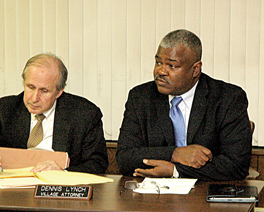By Dan Hust
MONTICELLO — Monticello’s controversial new police commission held its first official public meeting on Tuesday.
The Monticello Police Department’s union has mounted a lawsuit against the village for establishing the commission, even gaining the support of District Attorney Jim Farrell, who told the court he will not release confidential information to the department if he believes it will make its way to the commission.
Commission participants insisted Tuesday that won’t be the case.
“Anything confidential or investigations – that’s not what we’re here for,” remarked Mayor Gordon Jenkins, who is also now the Police Commissioner. “We don’t want to know about who’s getting arrested.”
Commission consultant Preston Felton, the retired acting superintendent of the NY State Police, seemed to agree, saying he’s coming on board as a law enforcement consultant, not a security consultant.
Felton, who once admitted to violating state conduct laws during the “Troopergate” scandal under former Gov. Eliot Spitzer, is now a private investigator and consultant in Orange County.
He served nearly three decades with the State Police, ultimately becoming its chief for 14 months before resigning. He’s familiar with Monticello, having worked here undercover for three years, and his wife has friends in the county.
“Over my career, I’ve really been known for my ability to get the best out of people,” Felton told the commission and audience Tuesday. “... I’m a level-headed person. ... You can be assured I will give you the best advice, from a leadership standpoint, that anyone can give you.”
Felton then began giving that advice, though his contract with the village – which will pay him $75 an hour for up to 20 hours a month (with more hours up to the village board) – wasn’t finalized until the board meeting later that evening.
Felton urged the commission to stick to “major” issues with the police department, though he acknowledged, “There must be some level of investigation for every complaint.”
He also encouraged fully documenting all instances of praise offered to the department, to counter the fact that “a lot of police departments get painted with a broad brush because of one or two bad apples.”
Commission member and Deputy Mayor TC Hutchins called for revising policies to accomplish such.
“There has to be some kind of accountability,” agreed Jenkins, who complained that the department has ignored his request for more foot patrols and a more regular presence at the Evergreen housing complex.
“Does it take a death for someone to take action on it?” he questioned. “I’m kind of tired of beating my head against the wall.”
“I don’t think you have to ‘ask’ anymore,” Hutchins told Jenkins.
The commission, said Hutchins and village attorney Dennis Lynch, can’t tell individual officers what to do, but it can tell the chief of police.
Acting Police Chief Mark Johnstone did not attend the meeting. While a Monticello police officer was present, he did not speak. Neither did the third commission member, Bess Davis.
(On Wednesday, Johnstone told the Democrat he had not been asked to attend but that he did meet with Felton and Village Manager John LiGreci the day after to discuss concerns. “It went very well,” he related, declining to go into further detail. “Our meeting wasn’t adversarial.”)
Overtime was also brought up on Tuesday – which, like the commission itself, is a source of legal contention between the department and the village.
LiGreci indicated overtime had already been reduced by 70 percent this year, and overall, the reductions could save Monticello as much as $70,000.
Savings were also realized, he said, from a Felton suggestion to have an attorney prosecute traffic tickets, rather than officers themselves.
“This has nothing to do with micromanaging,” LiGreci stated. “It’s strictly efficiency.”
There was some indication that Felton won’t always agree with the commission’s ideas.
“I do see some good in foot patrols,” he told Jenkins. “However, they’re not going to solve every problem you have.”
He recommended setting parameters – i.e., not requiring officers to walk a beat in subzero weather.
“And generally, policing should be where the trouble, the hotspots, are,” he added.
The public was allowed to comment at the end of the meeting, with Village Trustee Carmen Rue complaining that she had not been directly informed of the commission’s first gathering and thus arrived late.
Though not a village resident, Andrew Yeomans attended the meeting and wondered how the commission will bridge the gap with the police department.
“I admire the plan to make the streets safer and have accountability,” he stated, “... but this commission has turned into a public relations nightmare for the village.”
Lynch blamed some of that on the police union.
“You don’t bring a lawsuit before the commission has started,” he explained. “That’s not one of the things you do if you want to have a good relationship.”
Hutchins added that the “nightmare” perspective is not shared by all.
“I’ve had people call me today and say, ‘Keep up the good work!’” he told Yeomans. “... We’re not singling out anyone. ... The police department is almost 60 percent of our budget, and we want to make sure it’s running as efficiently as possible.”
Jenkins, too, felt the majority of village taxpayers support the commission.
“I just want accountability,” he insisted. “... We need law enforcement to be on our side and work with us.
“... We have to work together, and we have to be respected – both ways.”
The next meeting of the commission, which is open to the public, will be held on Tuesday, April 17 at 6 p.m. at the village hall.




